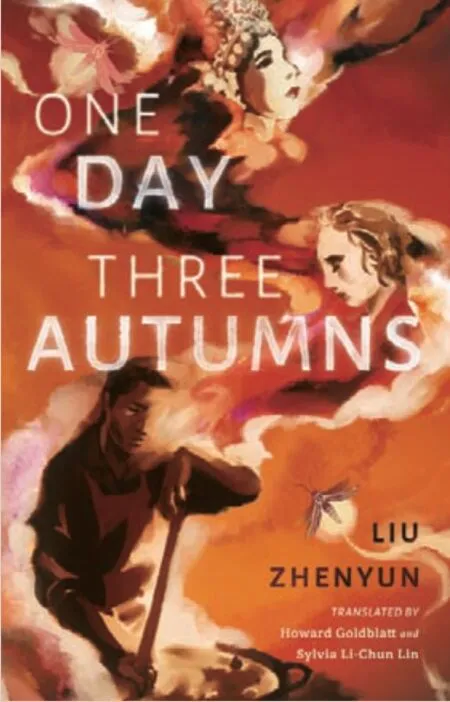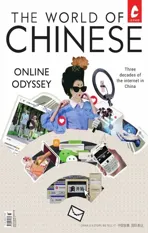Zoetrope
2023-12-16ByAmarsanaaBattulga
By Amarsanaa Battulga
Total Recap
By Amarsanaa Battulga

Illustration by Wang Siqi
From bite-sized summaries to contextual breakdowns, movie recap videos are diverse, controversial, and wildly popular
电影解说视频:当人们几分钟就能看完一部电影
I n November 2022, Liu Ziwen missed out on a business trip and a hefty bonus because she hadn’t watched enough TV.The 29-year-old had seen her colleagues with her manager during lunch breaks in their office to discussHouse of the Dragonover the past weeks, but “I hadn’t seen it, so I just finished my meal [alone] and got back to work,”Liu tells TWOC.
When the manager at the translation company in Nanjing, Jiangsu province, sent a list of employees chosen for the work trip abroad in the office group chat, Liu’s name wasn’t on it.Everyone that had been meeting at lunch to discuss the HBO prequel toGame of Throneswas included.
That evening, as soon as Liu got offwork, she didn’t start watching all 10 roughly hour-long episodes of the show, but instead searched online for overviews ofHouse of the Dragon.
These recap videos on platforms like Bilibili,Douyin (China’s version of TikTok), and YouTube, distill TV series or movies into summaries, from several minutes to around an hour long.Over clips or stills of the show, the presenter may also provide commentary.Recap videos have been around in China since at least 2015, but they sprung up like mushrooms during the Covid-19 pandemic.
There are thousands of recap channels online now, some with tens of millions of subscribers.One 10-minute recap of the 2017 Korean horror movieForgotten, posted in January this year, boasts over 23 million views on Bilibili.But even now, nearly a year on since cinemas in China stopped their pandemic-related regulations, recaps only seem more popular.“You couldn’t go to the cinema [in China]during the pandemic and I’m the type of person who can only watch something thatlong in a distraction-free environment,” says Hou Kaiyue, a first-year PhD student at the University of Bristol in the UK.“I started watching recaps when the pandemic started while I was doing my master’s [in Shanghai].”

While the TV show Game of Thrones consists of 73 episodes, each about 60 minutes in length, recap videos can summarize the story in under 20 minutes
For many, recaps help save time and relieve the fear of missing out.Liu realized that she wouldn’t be able to smoothly join in on her colleagues’ conversation if she also didn’t watchGame of Thrones, which has 73 episodes of approximately 60 minutes each.Recaps were a quick alternative.
Since Bilibili and Douyin profit from user-generated content and the ensuing traffic, they have been happy to settle lawsuits lodged by copyright holders rather than restrict recap video-makers’ freedom on their platforms.
For others, such as Hou, choosing recaps is related to fear of (and attraction to) horror movies.She says that she often watches recaps of movies full of suspense when she doesn’t “quite dare to watch the original.”
A team of researchers led by Xu Hailong,associate professor of film and cultural industries at Beijing’s Capital Normal University, published a study on recap videos earlier this year.After analyzing 400 recap video samples from five popular Bilibili channels, they observed that the most popular recaps were of films that include suspense elements, such as thriller, horror,adventure, and detective movies.
Recaps of such movies usually last between 10 to 30 minutes.“They just go through the story and there isn’t much interpretation because,frankly, there isn’t much to interpret [in these movies],” says Li Siyu, a master’s student of English literature at Nanjing University.
Li started watching recaps to stay up to date on the Marvel Cinematic Universe franchise that consists of dozens of films.But the Bilibili channel he regularly watches, Filmlast (which boasts over 1.2 million subscribers), offers far more than a simple synopsis.“Before retelling the plot, they introduce the behind-the-scenes story:how the project started, who was invited to write and direct, how the actors were cast,” Li explains.Each video is about an hour long.In contrast,recaps on Douyin are often under five minutes and are usually reserved for “more eye-catching genre films with simpler plots such as smallbudget horror films,” he says.
Others use these videos to get an accessible introduction to arthouse or experimental films.“I started Wong Kar-wai’sIn the Mood for Love[(2000)] many times but couldn’t finish.So, I watched a recap, then went back and watched the film till the end,” Hou tells TWOC.“The film’s pace is very slow; the narrative is a bit fragmented and confusing.I wanted to first find out what the story is so that, when I watched the full film, I could focus on things like filming techniques and metaphors.” Li, meanwhile,discovered Italian neorealism and Iranian New Wave films through a Bilibili channel called MovieTalk.“They interpret and even spoil some of the plot points, but that doesn’t affect me a lot,” he says.“I still see the whole movie afterward and form my own ideas.”
Recaps of non-Chinese films and TV shows are particularly popular, because most of them are never released in China.Only a few dozen foreign films receive a license to show in domestic theaters each year, and film festivals that screen more foreign titles are mostly restricted to big cities.Cinephiles are left to use illicit streaming or download platforms online to watch movies like Martin Scorsese’sKillers of the Flower Moon(2023), and shows like Netflix’s live-action adaptation ofOne Piece.
“I don’t want to spend time searching for a‘resource’ [that is, a link to pirated content]and waiting for it to finish downloading,” Li says.Instead, recap videos are often the most convenient way to learn the plot of foreign films and shows.Arguably, the first recap that became viral in China was a 2015 video titled“WatchBirdmanin Three Minutes,” which garnered over 4 million views on Bilibili within a few days before being taken down.The film had won four Academy Awards that year,including Best Picture, but it wasn’t released in Chinese cinemas.
For successful recap video producers, the genre can offer high returns for relatively little effort.To make a recap video, content producers download and watch the movie or TV show,write and record a summary text, and edit it together with the footage from the movie.
The process can even be accelerated with the use of AI tools.For a 40-yuan monthly subscription on the website Dubbing Goose, for example, content creators can have the text from an existing recap video transcribed and then paraphrased and made into a voiceover that is ready to be used for a new “recycled” video.Recap channels, especially those run by a team rather than an individual, can churn out such videos on a weekly or even daily basis and thus benefit more from Bilibili’s Creation Incentive Plan that pays creators based on how many views their videos have.

Some recap videos have helped introduce arthouse and experimental films to new audiences
But recap content creators often stray into legal gray areas when they use footage in their videos.In theory, they are not permitted to use clips from movies or TV shows without permission,though in practice this has not been strictly enforced for years.
In April 2021, however, more than 70 film companies, streaming platforms, and over 500 workers in the screen industry released a proposal for regulating alleged rampant copyright infringement by recaps and other edited videos based on films and TV shows.They proposed shifting the onus for copyright protection from individual content creators to the platforms where they publish their videos.Previously, copyright holders had to sue the recappers directly, while the new proposal called for platforms like Bilibili to have oversight and ensure removal of “unauthorized editing,sharing, recapping, and compilating of film and television content.”
Between June and December 2021 alone,Tencent Video lodged 168 lawsuits against Douyin for copyright infringement.In one case related to the 2021 web seriesThe Worm Valley,Douyin was ordered to pay Tencent more than 32.4 million yuan in compensation—a record amount for similar cases in China.But since Bilibili and Douyin continue to profit from user-generated content and the ensuing traffic,they have so far been happy to settle lawsuits lodged by copyright holders rather than restrict recap videomakers’ freedom on their platforms.
Similarly, in most cases it has also made more financial sense for the streaming services, who own online distribution rights to films and shows, to cut deals with the video platforms than to wage protracted court battles against them.(While theWorm Valleycase was a win for Tencent, most of its other cases are yet to be settled.) In July 2022 and April 2023, iQiyi and Tencent Video—two of the largest video entertainment platforms in China—announced respectively that they were cooperating with Douyin by authorizing the latter’s users to use their content library to make short videos, including recaps.From September 2022, iQiyi has even provided a list of movies and TV shows it wants promoted and Douyin has incentivized users to make derivative works based on those listed.
While that makes it easier for the thousands of recap video producers to find content for their work, it has also created fierce competition to stand out from the crowd.For example, Uncle Niu, a Bilibili channel with over 1.5 million subscribers, uses doggerel poetry in their recaps,while Teacher Liu Talks Movies narrates film plots in dialects for their nearly 5 million followers.“I consciously choose recappers based on their style of narration and speech fluency,” says Hou.
The current business arrangement appears mutually beneficial:The streaming services get free publicity from recap videos; video platforms gain revenue from recappers bringing traffic to their platforms;recappers maintain access to considerable TV and movie content without threat of copyright lawsuits.But the wider impact of recap videos on audiences and film culture remains to be explored.
As part of their study,Xu Hailong and his team concluded that by watching a recap, the viewer is guided by the host instead of the camera or other properties inherent to the medium of film.“Appreciation of art turns into a hunt for novelty,” they argued.Based on comments under recap videos, they found that only 0.78 percent of viewers expressed an interest in watching the original movie after watching the recap.
“I don’t think there’s a conflict between watching recaps and movies,” Li says, however,explaining that recaps don’t influence his desire to watch full films.“I still watch movies that are worth making time for.”Hou, on the other hand, admits that these days she “watches recaps much more often than actual films.” For some, recaps aren’t short enough.In the comment section of recap videos on Bilibili, some users tag AI-powered bots to generate an even shorter written summary of the video.
As for Liu, she still can’t quite tell whether her colleagues watched all 10 hours ofHouse of the Dragonor just a recap.Maybe it doesn’t matter,as long as she gets on the next business trip.
Video Games

Love Is All Around
(intiny, October 18)
A better title forLove Is All Aroundwould be“Scumbag Simulator.” This overtly sexist dating simulator has recently gone viral in China for its crass storyline that has players step into the shoes of a failed entrepreneur who, inexplicably, attracts the advances of multiple women.The story features a predictable plot and a cast of utterly detestable characters—a scene in the first chapter shows men sexually harassing a woman by surreptitiously taking photos up her skirt.
Depressingly, the game has over 20,000 overwhelmingly positive reviews on Steam.Though some at least seem to take the subject matter as a joke: “In reality, if I spend 300 yuan to take a beautiful woman out for a meal, she calls me a simp, but with this game, I spend 30 yuan and get to date six women,” wrote one Chinese reviewer on the platform.– Roman Kierst
Breakout 13
(ALT Lab, January 9)
This riveting game takes the genre of interactive video into the dark corners of a controversial internet addiction camp.Players make narrative choices as Zhang Yang, a gamer plunged into a rehabilitation nightmare by his mother after being expelled from high school.The treatment facility is led by the dubious Doctor Yang Yong’en, a character based on Yang Yongxin,an infamous real-life clinical psychologist who used controversial electroconvulsive therapy to“treat” video game and internet addiction in China throughout the 2000s.
Breakout 13offers little character depth, but is well-produced and rich in cultural references surrounding the history of the internet in China.Both Part 1 and 2 must be bought for the full story, a fact criticized by many reviewers on Steam.– R.K.


Bing in Wonderland
(Wanba Studio, January 13)
PlayingBing in Wonderlandis unadulterated 2D monster-slaying joy against a bizarre menagerie of foes across fantastical stages.The game boasts a trove of weapons—from bows to harps—each adding a unique rhythm to the battle, but it’s your character’s “butt slam” that steals the spotlight,turning posterior power into a strategic asset.
With a kaleidoscope of collectible items and upgrades, players can craft a fighting style as distinctive as the game’s art, which playfully nudges the boundaries of conventional game aesthetics.The game doesn’t take itself too seriously yet delivers robust, colorful combat and character progression.– R.K.
Books and Movies
One Day Three Autumns (Sinoist, September 29)
Drawing from the Chinese folklore of Hua Erniang, a tormented spirit lingering for millennia in the dreams of a small county’s residents, award-winning author Liu Zhenyun’s latest work is a blend of supernatural elements and very real trials of small-town life in Liu’s hometown, Yanjin.Legend has it that anyone failing to make the spirit laugh will be crushed and never be awakened again.As people from Yanjin seek fresh beginnings beyond its borders, they come to realize that what haunts them is not just the malevolent spirit but the wounds from their broken past.First published in Chinese in 2021, this dark-humored and sardonic novel is an exploration of humanity that showcases Liu’s vivid imagination.– Hayley Zhao

Straw Dogs of the Universe (Catapult, October 17)
Sixiang, a Chinese girl from a famine-struck village, is just 10 years old when her mother sells her to a human trafficker.Upon arriving in the US with only a bag of rice and six silver coins (the money used to buy her from her family), Sixiang sets out to find her long-lost father Guifeng, armed with a single photo of the man.Guifeng is working on the railroad in California, struggling to forge a new life in an often violent and unwelcoming foreign land.Set in the 19th century, Ye Chun’s latest historical fiction vividly portrays the harsh working conditions and xenophobia faced by Chinese immigrants who helped build the American West.– H.Z.
Lady Tan’s Circle of Women (Scribner, June 6)
In ancient China, women were mostly confined to the roles of obedient wife, loyal mother, and well-behaved daughter.In the Ming dynasty(1368 – 1644), however, Tan Yunxian defied these conventions by becoming a doctor.She later authoredMiscellaneous Records of a Female Doctor, the only medical book by a female physician in China for centuries.Lisa See’s latest novel narrates a fictional journey of Tan and her friend Meiling as they strive to provide medical care to women across society.A New York Times bestselling author with roots in China,See’s most popular works, includingShanghai GirlsandSnow Flower and the Secret Fan, have achieved worldwide acclaim, with a movie adaption of the latter even becoming a box office hit in China.– H.Z.
One and Four (October 27)
The son of the late Tibetan filmmaker Pema Tseden, Jigme Trinley finally brought his debut feature filmOne and Fourto Chinese theaters more than two years after its first screening at the Tokyo Film Festival in 2021.
Based on a short story by writer Chiangyong Tsering, the narrative transports viewers to a Tibetan forest ranger’s cabin on a night of howling winds and blizzards.He receives a visit from three mysterious men, each with unsettling intentions.Set in the 1990s, the film delves into the tension between wildlife poachers and the police in China’s Qinghai-Tibet Nature Reserve.– H.Z.

Invisible Summit (October 27)
Over 89 minutes,Invisible Summittells the story of how Zhang Hong became the first blind Asian person (and only the third blind person globally) to summit Mount Qomolangma (also known as Mount Everest).Director Fan Lixin’s documentary not only chronicles Zhang’s impressive journey, but also gives space for the human interactions and relationships that blossom and become strained around Zhang’s allconsuming mission, especially the bonds with his wife Xia Qiong and his mountaineering guide Qiangzi.
Documentaries, especially those that shed light on the lives of people with disabilities, are a rarity at the Chinese box office, makingInvisible Summita valuable watch, whether for its breathtaking scenic shots of the Himalayas or the gripping human drama at its core.– Sara Xun Huang
Only the River Flows (October 21)
Adapted from the 1988 novel of the same name by author Yu Hua,Only the River Flowsfollows detective Ma Zhe as he investigates the murder of an elderly woman in a fictional riverside town.As Ma delves deeper into the case, he begins to hallucinate and discovers that the line between reality and insanity is beginning to blur.
Winner of the Best Feature award at this year’s Pingyao International Film Festival, the movie grossed over 200 million yuan at the Chinese box office during its first nine days in theaters.This is the second time the renowned “scar literature” author’s works have been adapted for the big screen in China, after Zhang Yimou’s 1994 take onTo Live.– H.Z.

